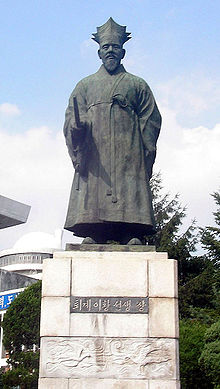Yi Hwang
| Yi Hwang | |
 |
|
| Korean name | |
|---|---|
| Hangul | 이황 |
| Hanja | 李滉 |
| Revised Romanization | I Hwang |
| McCune–Reischauer | Yi Hwang |
| Pen name | |
| Hangul | 퇴계 |
| Hanja | 退溪 |
| Revised Romanization | Toegye |
| McCune–Reischauer | T'oegye |
| Courtesy name | |
| Hangul | 경호 |
| Hanja | 景浩 |
| Revised Romanization | Gyeongho |
| McCune–Reischauer | Kyŏngho |
| Posthumous name | |
| Hangul | 문순 |
| Hanja | 文純 |
| Revised Romanization | Munsun |
| McCune–Reischauer | Munsun |
Yi Hwang (1501–1570) is one of the two most prominent Korean Confucian scholars of the Joseon Dynasty, the other being his younger contemporary Yi I (Yulgok). A key figure of the Neo-Confucian literati, he established the Yeongnam School and set up the Dosan Seowon, a private Confucian academy. Yi Hwang is often referred to by his pen name Toegye ("Retreating Creek"). His courtesy name was Gyeongho.
Yi Hwang was born in Ongye-ri, Andong, North Gyeongsang Province, in 1501. He belonged to the Jinseong Yi clan, and was the youngest son among eight children. A child prodigy, he learned the Analects of Confucius from his uncle at age twelve and admiring the poetry of Tao Qian, started writing poetry. His poem Yadang (hangul:야당, hanja:野塘, "Pond in the Wild"), written at the age of eighteen, is considered one of his major works. Around the age of twenty, he immersed himself in the study of I Ching and Neo-Confucianism.
He came to Seoul when he was 23 years old and entered the national academy Sungkyunkwan in 1523. In 1527 he passed preliminary exams to become a government official, but re-entered Sungkyunkwan at the age of 33 and socialized with the scholar Kim In-hu. He passed the civil service exams with top honors in 1534 and continued his scholarly pursuits whilst working for the government. He returned to his childhood home at the death of his mother at the age of 37 and mourned her for 3 years. He was appointed various positions from the age of 39 and sometimes held multiple positions including secret royal inspector, or Amhaengeosa (hangul:암행어사, hanja:暗行御史), in 1542. His integrity made him relentless as he took part in purges of corrupt government officials. On numerous occasions he was even exiled from the capital for his firm commitment to principle.
...
Wikipedia
